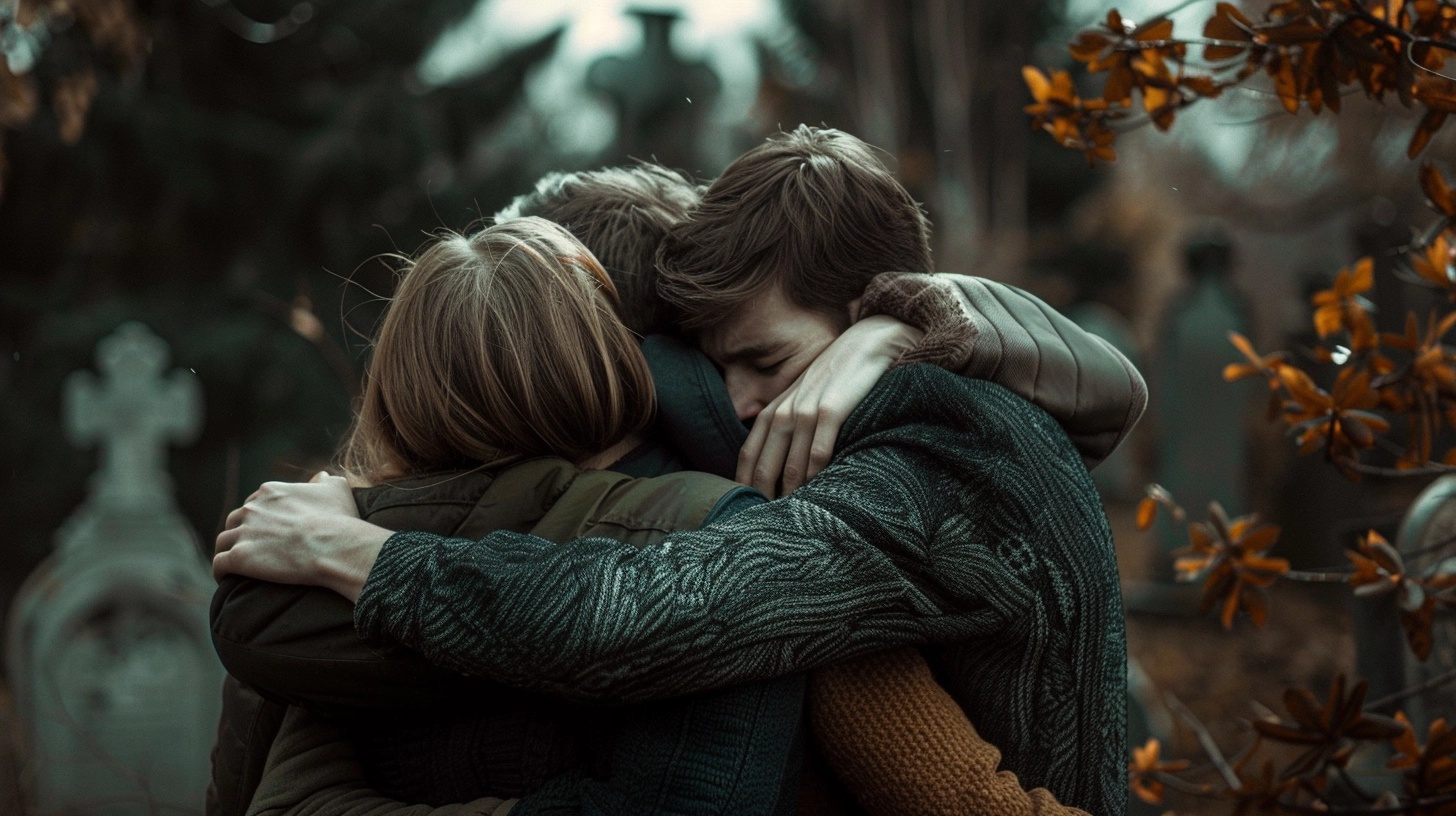Not everyone is religious. And when a non-religious friend or family member passes away, a non-religious funeral service to celebrate their life will likely be more appropriate. These ceremonies still often incorporate heartfelt readings that capture themes of love, loss, and remembrance without religious overtones. If you’re planning a non-appropriation-religious funeral or simply curious about secular options, here are some powerful and popular readings to consider.
“Funeral Blues” by W.H. Auden
This poignant poem, famously featured in the film “Four Weddings and a Funeral,” expresses deep sorrow and the feeling of emptiness following a loved one’s death. Its opening lines are particularly striking:
Stop all the clocks, cut off the telephone,
Prevent the dog from barking with a juicy bone,
Silence the pianos and with muffled drum
Bring out the coffin, let the mourners come.Let aeroplanes circle moaning overhead
Scribbling on the sky the message He Is Dead,
Put crepe bows round the white necks of the public doves,
Let the traffic policemen wear black cotton gloves.He was my North, my South, my East and West,
My working week and my Sunday rest,
My noon, my midnight, my talk, my song;
I thought that love would last for ever: I was wrong.The stars are not wanted now: put out every one;
Pack up the moon and dismantle the sun;
Pour away the ocean and sweep up the wood.
For nothing now can ever come to any good.
The poem beautifully captures the all-encompassing nature of grief and how it can make the world feel like it’s come to a standstill.
“Do Not Stand at My Grave and Weep” by Mary Elizabeth Frye
This comforting poem reassures mourners that the deceased is not truly gone. It encourages remembering the joy of life rather than dwelling on the sorrow of death. The poem begins:
“Do not stand at my grave and weep,
I am not there. I do not sleep…”
It’s a powerful reminder that our loved ones live on in the world around us and in our memories.
Do not stand at my grave and weep
I am not there. I do not sleep.
I am a thousand winds that blow.
I am the diamond glints on snow.
I am the sunlight on ripened grain.
I am the gentle autumn rain.When you awaken in the morning’s hush
I am the swift uplifting rush
Of quiet birds in circled flight.
I am the soft stars that shine at night.
Do not stand at my grave and cry;
I am not there. I did not die.
“Roads Go Ever On” by J.R.R. Tolkien
Taken from “The Lord of the Rings,” this passage symbolizes the journey of life and the continuation of paths after loss. It’s particularly fitting for those who loved adventure or literature:
Roads go ever ever on,
Over rock and under tree,
By caves where never sun has shone,
By streams that never find the sea;
Over snow by winter sown,
And through the merry flowers of June,
Over grass and over stone,
And under mountains in the moon.Roads go ever ever on
Under cloud and under star,
Yet feet that wandering have gone
Turn at last to home afar.
Eyes that fire and sword have seen
And horror in the halls of stone
Look at last on meadows green
And trees and hills they long have known.Roads go ever on and on
Out from the door where it began.
Now far ahead the Road has gone,
Let others follow it who can!
Let them a journey new begin,
But I at last with weary feet
Will turn towards the lighted inn,
My evening-rest and sleep to meet.
“She Is Gone” by David Harkins
This poem emphasizes the duality of grief and gratitude. It encourages mourners to cherish memories rather than solely focus on loss:
“You can shed tears that she is gone,
Or you can smile because she has lived…”
It’s a versatile piece that can be adapted for any gender, making it suitable for various situations.
You can shed tears that she is gone
Or you can smile because she has lived
You can close your eyes and pray that she will come back
Or you can open your eyes and see all that she has leftYour heart can be empty because you can’t see her
Or you can be full of the love that you shared
You can turn your back on tomorrow and live yesterday
Or you can be happy for tomorrow because of yesterdayYou can remember her and only that she is gone
Or you can cherish her memory and let it live on
You can cry and close your mind, be empty and turn your back
Or you can do what she would want: smile, open your eyes, love and go on.
“Requiem” by Robert Louis Stevenson
This short yet powerful poem expresses peace in death. Interestingly, it’s inscribed on Stevenson’s own gravestone, making it a fitting choice for a non-religious service:
Under the wide and starry sky,
Dig the grave and let me lie.
Glad did I live and gladly die,
And I laid me down with a will.This be the verse you grave for me:
Here he lies where he longed to be;
Home is the sailor, home from sea,
And the hunter home from the hill.
“When I Am Dead, My Dearest” by Christina Rossetti
Rossetti’s poem suggests that personal grief should be expressed in individual ways, rather than through traditional mourning rituals:
When I am dead, my dearest,
Sing no sad songs for me;
Plant thou no roses at my head,
Nor shady cypress tree:
Be the green grass above me
With showers and dewdrops wet;
And if thou wilt, remember,
And if thou wilt, forget.I shall not see the shadows,
I shall not feel the rain;
I shall not hear the nightingale
Sing on, as if in pain:
And dreaming through the twilight
That doth not rise nor set,
Haply I may remember,
And haply may forget.
It’s a beautiful reminder that everyone grieves differently and that it’s okay to do so.
“The Life That I Have” by Leo Marks
Originally written by Marks when he learned of his girlfriend’s death, this heartfelt tribute speaks of eternal love:
The life that I have
Is all that I have
And the life that
I have Is yours.The love that I have
Of the life that I have
Is yours and yours and yours.A sleep I shall have
A rest I shall have
Yet death will be but a pause.For the peace of my years
In the long green grass
Will be yours and yours and yours.
It’s particularly suitable for the loss of a partner or close loved one.
“Dear Lovely Death” by Langston Hughes
This poem offers a comforting perspective on death as a natural change rather than an end:
Dear lovely Death
That taketh all things under wing—
Never to kill—
Only to change
Into some other thing
This suffering flesh,
To make it either more or less,
But not again the same—
Dear lovely Death,
Change is thy other name.
It’s often chosen for funerals of children or young people, offering solace in difficult times.
“Farewell, Sweet Dust” by Elinor Wylie
This funeral poem focuses on scattering a loved one’s ashes, making it ideal for use at a cremation or when scattering ashes:
Now I have lost you, I must scatter
All of you on the air henceforth;
Not that to me it can ever matter
But it’s only fair to the rest of the earth.Now especially, when it is winter
And the sun’s not half so bright as he was,
Who wouldn’t be glad to find a splinter
That once was you in the frozen grass?Snowflakes, too, will be softer feathered,
Clouds, perhaps, will be whiter plumed;
Rain, whose brilliance you caught and gathered,
Purer silver have reassumed.Farewell, sweet dust; I never was a miser:
Once, for a minute, I made you mine:
Now you are gone, I am none the wiser
But the leaves of the willow are as bright as wine.
“No Matter What” by Debi Gliori
While originally from a children’s story book, this excerpt teaches about enduring love, making it a touching choice for a funeral, especially for a parent who has left young children behind:
Small said: “But what about when you’re dead and gone? Would you love me then? Does love go on?”
Large held Small snug as they looked out at the night, at the moon in the dark and the stars shining bright.
“Small, look at the stars – how they shine and glow. Yet some of those stars died a long time ago. Still they shine in the evening skies… Love, like starlight, never dies.”
“Intimations of Immortality” by William Wordsworth
Wordsworth’s poem reminds mourners that death doesn’t have to be the end:
“Though nothing can bring back the hour
Of splendor in the grass, of glory in the flower;
We will grieve not, rather find
Strength in what remains behind…”
It encourages finding strength in memories and continuing legacies.
“Play Jolly Music At My Funeral” by Richard Greene
For those who maintained a sense of humor even in the face of death, this poem by Richard Greene urges funeral-goers to dispense with traditional somber tones:
I’ve taken in recent years to thinking about my funeral
and have decided to make one paramount request:
play jolly music at that ritual.
What good does it do to heap on dirges or other mournful melodies?
I won’t be there to be gratified by the grieving
and if I could tune in
I’d be happier to see those present have some relief.
Dixieland would be nice.
Joplin would be fine.
Something by Fats Waller would certainly do.
Those early jazzmen knew what they were up to
when they set about making funeral marches swing.
So swing me away, please, with a rousing tune.
It’s a reminder that funerals can also celebrate life and bring moments of joy amidst sadness.
Funeral Readings And Poems For The Non-Religious

These non-religious funeral readings offer comfort, reflection, and sometimes even a touch of humor. They allow mourners to honor the deceased while expressing their own feelings of loss and remembrance. Whether you’re planning a funeral or simply exploring options, these readings provide beautiful alternatives to traditional religious texts, helping to create a meaningful and personalized farewell.
Remember, the choice of reading should reflect the personality and wishes of the deceased, as well as provide comfort to those left behind. These poems and passages can be powerful tools in creating a touching, memorable service that truly celebrates a life well-lived.
These non-religious funeral readings offer comfort and solace during a time of loss. #celebratinglife #memorialreadings #funeralservices #nonreligiousfuneral #griefpoetry Share on X










 Apple Intelligence: Get a Sneak Peek of the Future of iPhone AI with iOS 18.1 Developer Beta
Apple Intelligence: Get a Sneak Peek of the Future of iPhone AI with iOS 18.1 Developer Beta
Leave a Reply
You must be logged in to post a comment.